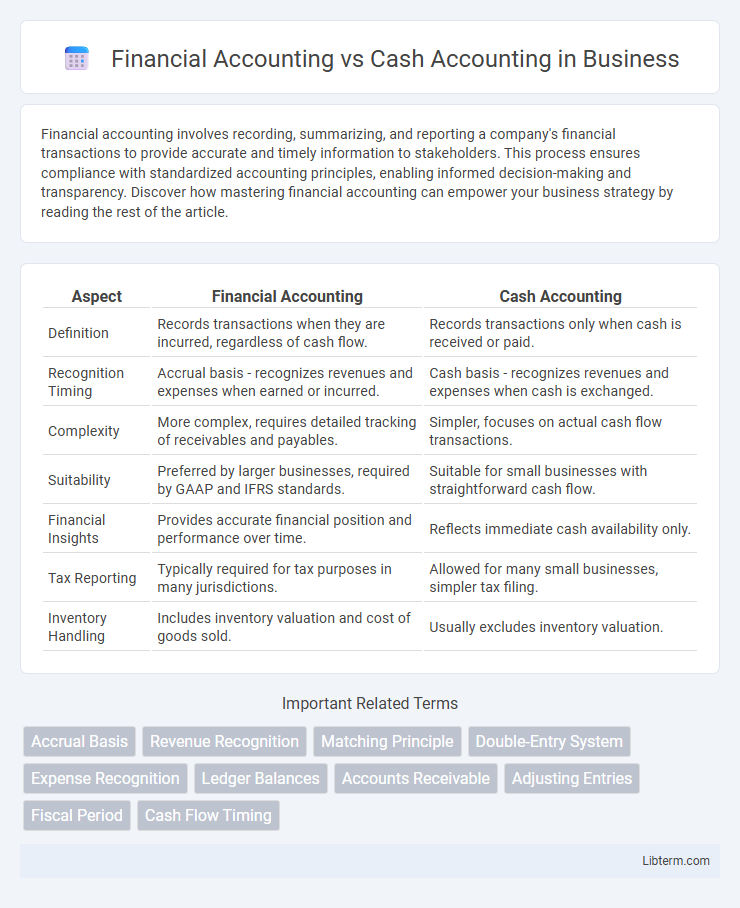Financial accounting involves recording, summarizing, and reporting a company's financial transactions to provide accurate and timely information to stakeholders. This process ensures compliance with standardized accounting principles, enabling informed decision-making and transparency. Discover how mastering financial accounting can empower your business strategy by reading the rest of the article.
Table of Comparison
| Aspect | Financial Accounting | Cash Accounting |
|---|---|---|
| Definition | Records transactions when they are incurred, regardless of cash flow. | Records transactions only when cash is received or paid. |
| Recognition Timing | Accrual basis - recognizes revenues and expenses when earned or incurred. | Cash basis - recognizes revenues and expenses when cash is exchanged. |
| Complexity | More complex, requires detailed tracking of receivables and payables. | Simpler, focuses on actual cash flow transactions. |
| Suitability | Preferred by larger businesses, required by GAAP and IFRS standards. | Suitable for small businesses with straightforward cash flow. |
| Financial Insights | Provides accurate financial position and performance over time. | Reflects immediate cash availability only. |
| Tax Reporting | Typically required for tax purposes in many jurisdictions. | Allowed for many small businesses, simpler tax filing. |
| Inventory Handling | Includes inventory valuation and cost of goods sold. | Usually excludes inventory valuation. |
Introduction to Financial Accounting and Cash Accounting
Financial accounting records and reports all financial transactions of a business based on the accrual principle, recognizing revenues and expenses when they are earned or incurred, regardless of cash flow. Cash accounting, on the other hand, records transactions only when cash is received or paid, providing a straightforward view of cash flow but lacking the comprehensive financial position reflected in financial accounting. Businesses use financial accounting to produce detailed financial statements for stakeholders, while cash accounting is often preferred by small businesses for simplicity in tracking cash movements.
Definition and Key Concepts of Financial Accounting
Financial accounting is the systematic recording, summarizing, and reporting of a company's financial transactions based on the accrual basis, recognizing revenues and expenses when they are incurred regardless of cash flow. Key concepts include the balance sheet, income statement, and cash flow statement, which provide a comprehensive view of financial performance and position. Unlike cash accounting, financial accounting adheres to Generally Accepted Accounting Principles (GAAP) or International Financial Reporting Standards (IFRS) to ensure consistency and comparability in financial reporting.
Definition and Key Concepts of Cash Accounting
Cash accounting records financial transactions only when cash is received or paid, focusing on actual cash flow rather than when transactions are incurred. This method simplifies bookkeeping by recognizing revenues and expenses at the point of cash exchange, providing a clear view of available cash resources. Key concepts of cash accounting include real-time cash tracking, exclusion of accounts receivable and payable, and suitability for small businesses with straightforward financial activities.
Main Differences Between Financial and Cash Accounting
Financial accounting records revenues and expenses when they are incurred, adhering to the accrual basis and generally accepted accounting principles (GAAP). Cash accounting only records transactions when cash is received or paid, focusing on actual cash flow without recognizing accounts receivable or payable. The main differences lie in timing of transaction recognition, compliance with accounting standards, and the level of detail provided for financial analysis and reporting.
Advantages of Financial Accounting
Financial accounting provides a comprehensive view of a company's financial performance by recording all transactions, including credit sales and expenses, offering accurate insights into profitability and financial position. It complies with Generally Accepted Accounting Principles (GAAP) and International Financial Reporting Standards (IFRS), enhancing transparency and credibility for investors, lenders, and regulatory bodies. This method supports strategic decision-making by reflecting accrued revenues and expenses, enabling businesses to assess long-term financial health and plan for growth.
Advantages of Cash Accounting
Cash accounting offers simplicity by recording transactions only when cash changes hands, making it easier for small businesses to track actual cash flow and manage liquidity. This method provides a clear, real-time picture of available funds, aiding in effective cash management and avoiding potential overdrafts. It also reduces complexity and administrative costs compared to accrual accounting, which requires tracking receivables and payables.
Disadvantages of Financial Accounting
Financial accounting can be complex due to its reliance on accrual-based methods, which require tracking revenues and expenses regardless of cash flow. This complexity often results in higher administrative costs and the need for professional expertise to accurately prepare financial statements. Additionally, financial accounting may present a less immediate view of cash availability, potentially complicating short-term cash management decisions.
Disadvantages of Cash Accounting
Cash accounting records transactions only when cash changes hands, which can lead to misleading financial statements as it ignores accounts receivable and payable. This method is less useful for businesses with significant credit transactions or inventory, limiting accurate profit and loss assessment during specific periods. the lack of matching principle adherence in cash accounting can result in poor financial analysis and decision-making.
Choosing the Right Accounting Method for Your Business
Selecting the appropriate accounting method depends on your business size, cash flow complexity, and tax obligations. Financial accounting offers a comprehensive view with accrual-based reporting that tracks revenues and expenses when they occur, suitable for larger businesses and investors. Cash accounting records transactions only when cash changes hands, providing simplicity and immediate cash flow insights, ideal for small businesses and sole proprietors.
Conclusion: Financial Accounting vs Cash Accounting
Financial accounting provides a comprehensive view of a company's financial health by recording revenues and expenses when they are incurred, aligning with accrual principles. Cash accounting offers a straightforward method by recording transactions only when cash changes hands, making it simpler for small businesses and individuals. Choosing between financial accounting and cash accounting depends on the complexity of the business, regulatory requirements, and the need for detailed financial reporting.
Financial Accounting Infographic

 libterm.com
libterm.com